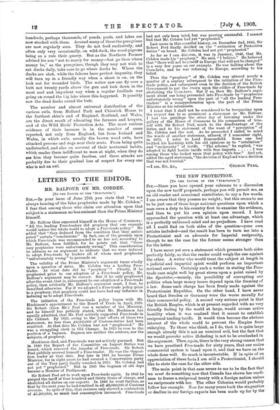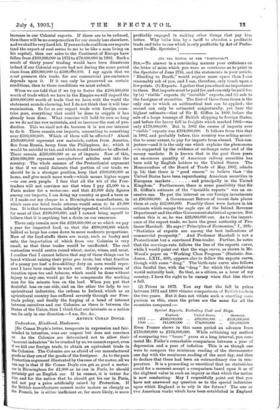THE NEW PROTECTION.
[TO THR EDITOR OF THE "SPECTATOR."]
SIR,—Since you have opened your columns to a discussion upon the new tariff proposals, perhaps you will permit me, as an old reader and occasional contributor, to say a few words. I am aware that they possess no weight; but this seems to me to be just one of those large national questions upon which a man owes a duty to his country first to examine the evidence, and then to put his own opinion upon record. I have approached the question with at least one advantage, which is a perfectly unbiassed mind and no prejudices. I have read all I could find on both sides of the question—your own articles included—and the result has been to turn me into a Protectionist and an advocate for Imperial reciprocity, though to me the case for the former seems stronger than for the latter.
I have never yet seen a statement which presents both sides perfectly fairly, so that the reader could weigh the one against the other. A writer who would treat the subject at length in a judicial and impartial spirit would perform an important national service. Certainly such a writer in stating the Free. trade case might well lay great stress upon a point raised by the Spectator,—namely, the possibility of corrupting our politics when large money issues depend upon the framing of a law. Some such charge has been freely made against the Protectionist Republics. On the other hand, I have never heard that Sweden or Germany were the worse morally for their commercial policy. A second very serious point is that the British Empire, which is at present regarded with no very friendly feeling by the world at large, would arouse active hostility when it was realised that it meant to establish reciprocal trading tariffs. It would then become the obvious interest of the whole world to prevent the Empire from enlarging. To those who think, ELS I do, that it is quite large enough already this is not an unmixed evil, but the fact that we would provoke active ill-feeling is not to be overlooked in the argument. Then, again, there is the very strong reason that we have practised Free-trade for sixty years, that our entire commercial system is based upon it, and that we have on the whole done well. So much is incontestable. If in spite of an appreciation of these facts I am still a Protectionist, I should like to state the case for the other side.
The main point in that case seems to me to be the fact that we must do something now that Canada has shown her readi- ness to frame a reciprocal treaty with a foreign nation unless we reciprocate with her. The other Colonies would probably follow her example. Now for many years back the stagnation or decline in our foreign exports has been made up for by the increase in our Colonial exports. If those are to be reduced, then there will be no compensation for our steady loss elsewhere, and we shall be very hard hit. If you exclude coal from our exports (and the export of coal seems to me to be like a man living on his capital), then our sales to the Continent of Europe have fallen from 2100,000,000 in 1872 to 279,000,000 in 1902. Such a result of thirty years' trading would have been disastrous indeed if our Colonial exports had not during the same period risen from 260,000,000 to 2108,00,000. I say again that we must preserve this trade, for our commercial pre-eminence depends upon it. If it can only be preserved on certain conditions, then to those conditions we must submit.
When we are told that if we try to foster the 2200,000,000 worth of trade which we have in the Empire we will imperil the 2800,000,000 worth of trade that we have with the World the statement sounds alarming, but I do not think that it will bear examination. So far as our export trade with foreign coun- tries goes, everything that could be done to cripple it has already been done. What remains will hold its own so long as we do not tax raw materials, and so increase the cost of pro- duction. This we shall not do, because it is not our interest to do it. There remain our imports, amounting to something over 2500,000,000. Which of them will be affected? About 2160,000,000 represent raw materials, cotton from America, flax from Russia, hemp from the Philippines, &c., which it would be suicidal to tax, and which would therefore be affected. There remain 2350,000,000 or so of imports. Now of this, 2100,000,000 represent manufactured articles sent into the country. The whole essence of the Protectionist argument is that if we could dislocate that portion of our trade, we should be in a stronger position, keep that 2100,000,000 at home, and give much more work—which means higher wages —to our own people. I fear that all the wit of the Free- traders will not convince me that when I pay 21,000 to a Paris maker for a motor-ear, and that 21,000 duly figures among our imports, I am doing my country as good a turn as if I made out my cheque to a Birmingham manufacturer, in which case our total trade returns would seem to be 21,000 less. It is that transaction, infinitely repeated, which accounts for most of that 2100,000,000, and I cannot bring myself to believe that it is anything but a drain on our resources.
There only remain now the 2220,000,000 or so which we pay a year for imported food, so that the 2800,000,000 which bulked so large has come down to more moderate proportions. Now of the food-stuffs there are many, such as barley and oats, the importation of which from our Colonies is very small, so that these trades would be unaffected. The real contention would centre round wheat, maize, wines, and meat. I confess that I cannot believe that any of these things can be taxed without raising their price pro tanto, but what fraction of a penny per loaf a five-shilling duty on corn would repre- sent I have been unable to work out. Surely a remission of taxation upon tea and tobacco, which could be done without injury to any one, would go far to compensate the working man for his minute loss on the loaf. When you put that doubtful loss on one side, and on the other the help to our agricultural industries, the redress to Ireland, which as an agricultural country has suffered severely through our Free- trade policy, and finally the forging of a bond of interest between ourselves and our Colonies, as there is between the States of the Union, then I think that our interests as a nation can lie only in one direction.—I am, Sir; &a,
AETHIM CONAN DOYLE.
Undershaw, Hind head, Haslemere.
[Sir Conan Doyle's letter, temperate in expression and fair- minded in intention, wins our respect but does not convince us. As the Colonies are determined not to allow their "nascent industries "to be crushed by us, we cannot expect, even if we kill our foreign trade, to obtain an equivalent trade in the Colonies. The Colonies are as afraid of our manufactured goods as they are of the goods of the foreigner. As to the pure Protection argument illustrated by the ease of the motor, all we can Bay is that if Sir Conan Doyle can get as good a motor- car in Birmingham for 21,000 as he can in Paris, he should certainly get an English car. If he cannot, it is better for him and for the nation that he should get his car in Paris, and not pay a price artificially raised by Protection. If the British manufacturer cannot make motors as cheaply as the French, he is either inefficient or, far more likely, is more profitably engaged in making other things that pay him better. Why bribe him by a tariff to abandon a profitable trade and take to one which is only profitable by Act of Parlia- ment P—En. Spectator.]











































 Previous page
Previous page